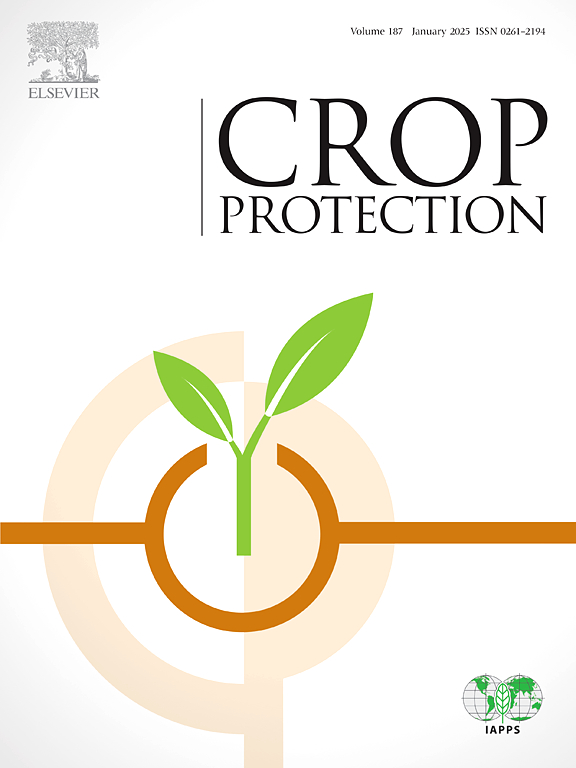First report of brown rot caused by Monilia yunnanensis on kiwiberry (Actinidia arguta) in China
IF 2.5
2区 农林科学
Q1 AGRONOMY
引用次数: 0
Abstract
Kiwiberry (Actinidia arguta) is one of the most nutritious fruits in China, with edible and traditional medicinal values. Brown rot, caused by different species of Monilia, is a common and severe postharvest disease of fruit. In September and October 2023, kiwiberry brown rot was observed in several fruit supermarkets in Harbin, Heilongjiang Province. Fungal isolates were obtained from the edges of lesions on fruit with typical symptoms and identified as M. yunnanensis on the basis of morphological characteristics (colonies and conidia) and multi-locus phylogenetic analyses (ITS, TUB, and lcc2). Pathogenicity experiments showed that M. yunnanensis was able to infect kiwiberry fruit and cause symptoms of brown rot, demonstrating that M. yunnanensis was the causal agent of kiwiberry brown rot. In the present study, we reported for the first time that M. yunnanensis was the causative agent of kiwiberry brown rot, thus laying the foundation for the subsequent development of reasonable and effective postharvest fruit control measures.
云南念珠菌侵染猕猴桃褐腐病国内首次报道
猕猴桃(猕猴桃)是中国最有营养的水果之一,具有食用和传统药用价值。褐腐病是果实采后常见的严重病害,由不同种类的念珠菌引起。2023年9、10月在黑龙江省哈尔滨市多家水果超市发现猕猴桃褐腐病。从具有典型症状的果实损伤边缘分离得到真菌,根据菌落和分生孢子的形态特征和ITS、TUB和lcc2的多位点系统发育分析,鉴定为云南分枝杆菌。致病性实验表明,云南支原体能够侵染猕猴桃果实并引起褐腐病症状,表明云南支原体是猕猴桃褐腐病的致病因子。本研究首次报道了云南支原体是猕猴桃褐腐病的致病因子,为后续制定合理有效的采后果实防治措施奠定了基础。
本文章由计算机程序翻译,如有差异,请以英文原文为准。
求助全文
约1分钟内获得全文
求助全文
来源期刊

Crop Protection
农林科学-农艺学
CiteScore
6.10
自引率
3.60%
发文量
200
审稿时长
29 days
期刊介绍:
The Editors of Crop Protection especially welcome papers describing an interdisciplinary approach showing how different control strategies can be integrated into practical pest management programs, covering high and low input agricultural systems worldwide. Crop Protection particularly emphasizes the practical aspects of control in the field and for protected crops, and includes work which may lead in the near future to more effective control. The journal does not duplicate the many existing excellent biological science journals, which deal mainly with the more fundamental aspects of plant pathology, applied zoology and weed science. Crop Protection covers all practical aspects of pest, disease and weed control, including the following topics:
-Abiotic damage-
Agronomic control methods-
Assessment of pest and disease damage-
Molecular methods for the detection and assessment of pests and diseases-
Biological control-
Biorational pesticides-
Control of animal pests of world crops-
Control of diseases of crop plants caused by microorganisms-
Control of weeds and integrated management-
Economic considerations-
Effects of plant growth regulators-
Environmental benefits of reduced pesticide use-
Environmental effects of pesticides-
Epidemiology of pests and diseases in relation to control-
GM Crops, and genetic engineering applications-
Importance and control of postharvest crop losses-
Integrated control-
Interrelationships and compatibility among different control strategies-
Invasive species as they relate to implications for crop protection-
Pesticide application methods-
Pest management-
Phytobiomes for pest and disease control-
Resistance management-
Sampling and monitoring schemes for diseases, nematodes, pests and weeds.
 求助内容:
求助内容: 应助结果提醒方式:
应助结果提醒方式:


